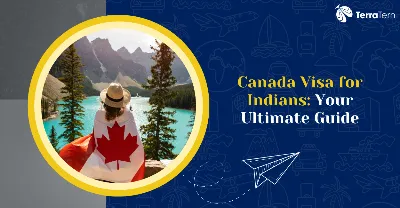Key Highlights
- Understanding Canada Visa Types for Indians in 2025
- Canada Visitor & Tourist Visas in 2025
- Canada Work Visa for Indians
- Canada Transit Visa for Indian Travellers
- Step-by-Step Canada Visa Application Process for Indian Citizens
- Canada Work Visa Requirements For Indian Citizens in 2025
- Proof of Funds, Medicals, and Police Clearances
- Expert Tips for a Successful Canada Visa Application for Indians in 2025
- Common Reasons for Canada Visa Rejection & How to Avoid Them in 2025
- Canada Visa Latest Facts & News: Stay Ahead!
- Conclusion
Want to visit India from Canada in 2025? The process of getting a Canada visa for Indians can be a nightmare, whether you are going there for leisure, work, or study purposes. This very text, prepared by professionals, will help to clear up the whole process for the citizens of India. Our team shall supply you with timely information, indispensable hints on the successful application, and a step-by-step guide that would make your application go as smoothly as possible.
Understanding Canada Visa Types for Indians in 2025
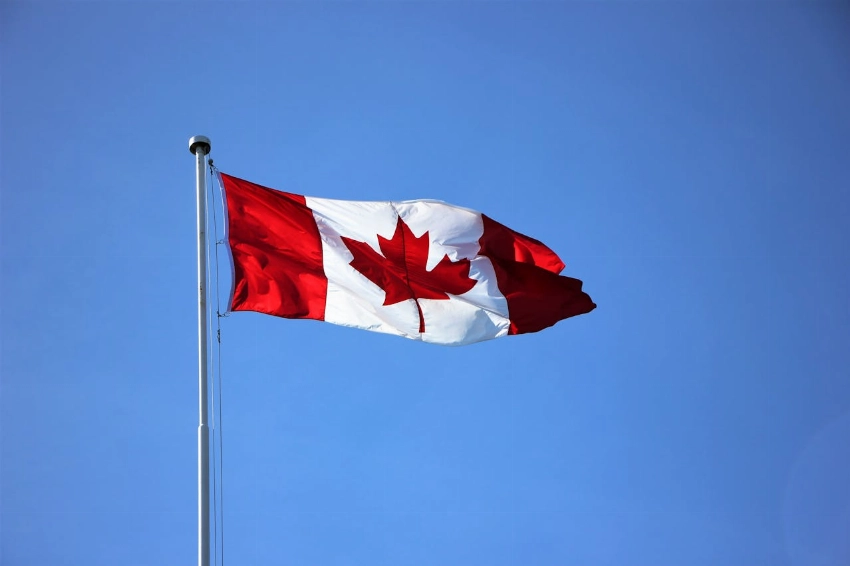
The first step in your Canada visa for Indians process is to determine the appropriate type of visa that suits your travel intentions. The first and most important step would be to select the proper type of an appropriate visa, which would determine the list of documents you would need, the process of applying, and eventually, whether you would be approved or not. The following segment explains the different types of Canada visa for Indians available to Indian nationals: visitor, work, transit, student, and business visas, and explains which type of Canada visa for Indians should be applied for by whom.
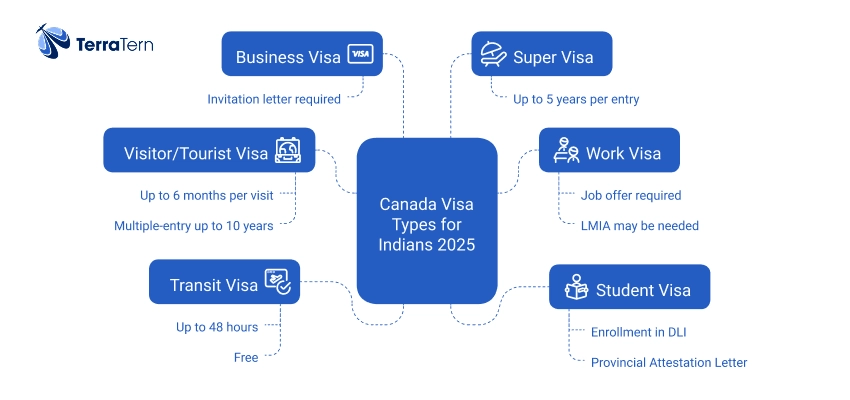
|
Visa Type |
Purpose |
Duration |
Key Requirement |
|
Visitor & Tourist Visa |
Tourism, family visits, short business trips, and attending conferences |
Up to 6 months per visit (multiple entries for up to 10 years or passport expiry) |
Proof of funds, strong ties to India, intent to return |
|
Work Visa |
Employment in Canada based on a job offer |
Varies based on permit type and job contract |
Job offer, LMIA (if applicable), eligibility for open work permit |
|
Transit Visa |
Passing through a Canadian airport on the way to another country |
Up to 48 hours |
Confirmed onward travel |
|
Student Visa (Study Permit) |
Enrollment in a Canadian-designated learning institution (DLI) |
Duration of the study program |
Acceptance letter from DLI, provincial attestation letter, proof of funds |
|
Business Visa |
Engaging in business activities (e.g., attending meetings, negotiating contracts) |
Short-term, usually within visitor visa parameters |
Invitation letter from Canadian host, business itinerary |
Canada Visitor & Tourist Visas in 2025

The visitor/ tourist visa is an ideal option for Indian citizens interested in travelling to Canada in order to experience nature at its best, visit family and friends, as well as meeting within short business. This type of Canada visa for Indians enables people to stay temporarily, usually not more than six months per visit. Although you are expected to spend at least six months, the actual amount is left at the discretion of the border services officer at the time of your arrival in Canada, and he will stamp the allowed period in your passport. Canada has single-entry visas, as well as multiple-entry visas.
-
Multiple-Entry Visa: The multiple-entry visa can come in handy, especially when you need to travel to Canada more than once within the time frame of the visa, which can go as long as 10 years, as long as the passport remains valid until one month before that time.
-
Visitor Visa: To apply for a visitor visa, you must prove that you have intentions of going back to India when your temporary stay is over. This is one of the vital points that the immigration officers assess. You would have to demonstrate the close links with your home country in the form of family, job, home-ownership, or other good assets. Having financial stability is also important, whereby you will need to demonstrate that you have enough finances to take care of your expenses throughout your stay in Canada, but without having to work.
Canada Work Visa for Indians
Canada Work Visa for Indians is an essential requirement. Canada offers different types of work permits, broadly categorised into employer-specific and open work permits. Understanding the distinctions between these types, along with the associated Canada work visa requirements for Indian citizens and recent policy changes, is crucial for a successful application. Let’s know more about Canada Work Visa for Indians!
Understanding Canada Work Permit Types for Indians
Indian citizens who wish to work in Canada must obtain a work permit. These permits generally fall into two main categories:
1. Employer-Specific Work Permit
This type of work permit ties you to a specific employer, occupation, and geographical location in Canada. You can only work for the employer named on your permit, in the specified job, and at the designated place.
Key Requirement: Labour Market Impact Assessment (LMIA):
-
For most employer-specific work permits, your Canadian employer must first obtain a Labour Market Impact Assessment (LMIA) from Employment and Social Development Canada (ESDC).
-
An LMIA confirms that there is a genuine need to hire a foreign worker for a specific job. It ensures that no Canadian citizen or permanent resident is available and qualified to do the work.
-
The LMIA process involves the employer demonstrating efforts to recruit Canadian workers before hiring a foreign national.
LMIA-Exemptions: It's important to note that certain occupations and programs are exempt from the LMIA requirement. These typically fall under Canada's International Mobility Program (IMP) and include categories like:
-
Workers covered by international trade agreements (e.g., CUSMA, CETA).
-
Intra-company transferees (employees moving within the same company).
-
Workers whose employment offers significant economic, social, or cultural benefits to Canada.
-
Participants in reciprocal exchange programs (e.g., International Experience Canada).
-
Spouses of certain skilled workers (though eligibility has recently changed, as detailed below).
2. Open Work Permit
An open work permit offers flexibility, allowing you to work for almost any eligible employer in Canada (with some exceptions related to ineligible employers). You are not tied to a specific job or employer.
Eligibility for an Open Work Permit
Open work permits are typically granted in specific situations, such as:
-
Graduates of Canadian post-secondary institutions (Post-Graduation Work Permit).
-
Spouses or common-law partners of certain skilled workers or international students.
-
Individuals applying for permanent residence in Canada.
-
Refugee claimants.
Recent Changes for Family Members (Effective January 21, 2025):
-
Significant changes have been implemented regarding open work permits for family members of foreign workers.
-
Spouses and Common-Law Partners: As of January 21, 2025, spouses and common-law partners of foreign workers will generally only be eligible for an open work permit if the primary worker is employed in a high-skilled occupation. This typically includes jobs categorised under TEER Category 0 (management), TEER 1 (professional), and specific occupations within TEER 2 and 3 that address labour market needs.
-
Dependent Children: A major change is that dependent children of foreign workers are, in most cases, no longer entitled to open work permits. This means they cannot seek paid employment during their stay based solely on their parents' work permit.
General Requirements for Both Permit Types for Indians in 2025
Regardless of whether you apply for an employer-specific or an open work permit, you will generally need to provide:
-
Valid Job Offer Letter: For both permit types, a valid job offer letter (or acceptance letter for students applying for open work permits as a spouse of a student) is crucial. It must clearly outline the terms of employment or the basis for your eligibility.
-
Demonstration of Qualifications: You must provide proof of your educational credentials, work experience, and any specific skills required for the job.
-
Police Clearance Certificate (PCC): A Police Clearance Certificate from India (and any other country where you've lived for six months or more since turning 18) is typically required to ensure you have no criminal record.
-
Medical Examination: A medical examination conducted by a panel physician certified by Immigration, Refugees and Citizenship Canada (IRCC) is mandatory for most work permit applicants. This assesses your health status and ensures you don't pose a public health risk.
Also Read: Apply Canada Work Visa: Types, Fees, Eligibility & More
Canada Transit Visa for Indian Travellers

Provided that you travel to another country and that you need to pass a Canadian airport on the way, and that you spend 48 hours or less, you will probably have to get a Canada transit visa for Indians. It should be mentioned that even when you just do not intend to leave the transit area of the airport, this Canada visa for Indians is obligatory in case one is a citizen of a country which requires a visa, such as India. Indian travellers can get good news about the fact that the Canada transit visa for Indians is free. Holders of this visa are offered an easy time in airports in Canada without the need to have a complete visitor visa. But in the case that your layover period is more than 48 hours, you will need to apply for a standard visitor visa instead. A Canada transit visa for Indians is also easy to seek, with your only major requirement being evidence that you are moving on.
Student & Other Visas
In addition to the common visitor, work, and transit visas, Canada offers a range of other Canada visa categories for Indians designed to accommodate specific purposes of stay. These specialised visas cater to diverse needs, from academic pursuits to family reunification and even exceptional circumstances.
Student Visas (Study Permits)
For Indian students aspiring to pursue higher education in Canada, a Study Permit is the primary requirement. This permit is mandatory for academic programs exceeding six months in duration at a Designated Learning Institution (DLI) in Canada.
-
Acceptance Letter: A crucial document for a study permit application is an official acceptance letter from a DLI. This letter confirms your enrollment in a recognised Canadian educational program.
-
Provincial Attestation Letter (PAL): As of early 2024, most international students, including those from India, are also required to obtain a Provincial Attestation Letter (PAL) from the province or territory where they intend to study. This new requirement is part of Canada's strategy to manage the volume of international students and ensure adequate support systems.
-
Proof of Funds: Demonstrating sufficient financial resources is a significant requirement. You must provide evidence that you can cover your:
-
Tuition fees for your program.
-
Living expenses for yourself and any accompanying family members.
-
Return transportation to India.
-
The required amount for living expenses is adjusted annually by IRCC and has seen increases in 2024-2025.
Other Specialised Visas
Beyond student permits, Canada offers several other specific visa categories tailored to unique situations:
-
Super Visa for Parents and Grandparents
-
This multiple-entry visa is designed for parents and grandparents of Canadian citizens or permanent residents.
-
It allows for extended visits, permitting stays of up to five years per entry, with the possibility of applying for an extension of up to two additional years while in Canada.
-
The Super Visa is valid for up to 10 years.
-
Key Canada work visa requirements for Indian citizens include an invitation letter from their child/grandchild in Canada, proof of the child/grandchild meeting the Minimum Necessary Income (MNI) threshold, and mandatory private Canadian medical insurance coverage (at least 100,000 CAD for one year, covering healthcare, hospitalisation, and repatriation).
-
Humanitarian and Compassionate (H&C) Considerations
-
This provision allows individuals to apply for permanent residency in Canada based on exceptional personal circumstances, even if they don't meet the criteria for other immigration programs.
-
H&C applications are assessed on a case-by-case basis and consider factors such as significant hardship if required to leave Canada, establishment in Canada, family ties, and the best interests of any children involved.
-
These applications are complex and require compelling evidence of the unique circumstances.
-
Visas for Specific Cultural or Sports Events
-
Individuals invited to participate in specific cultural or sports events in Canada may apply for a temporary resident visa (visitor visa) with a special event code.
-
While having an invitation and an event code can streamline tracking, applicants must still meet all standard visitor visa eligibility criteria, including proving their intent to leave Canada at the end of the event.
Each of these categories has distinct eligibility criteria, application processes, and required documentation that must be thoroughly met for a successful application. It is always advisable to consult the official IRCC website or a regulated Canadian immigration consultant for the most accurate and up-to-date information for your specific situation.
Step-by-Step Canada Visa Application Process for Indian Citizens
The process of your application for a Canada visa for Indians need not be very difficult as long as you have a logical application plan. In particular, the Immigration, Refugees and Citizenship Canada (IRCC) is mostly favourable to submissions via the internet, which usually saves time. This section states in neat steps the process of seeing Indian citizens go through the application, giving one a clear understanding of how to go through the process, what are types of Canada visa for Indians to apply for, and getting a response.
-
Gathering Required Documents
Before initiating your online application, compiling all necessary documents is paramount. Missing or incorrect documents are among the leading causes of application delays or rejections. The specific documents required will vary based on your Canada visa for Indians type, but generally include:
-
Valid Passport: Your passport must be valid for at least six months beyond your intended stay in Canada. Include scanned copies of all stamped pages, previous visas, and the biographical page.
-
Application Forms: Duly completed and signed forms specific to your visa category (e.g., IMM 5257 for Temporary Resident Visa, IMM 1295 for Work Permit).
-
Proof of Financial Support: Bank statements for the last six months, fixed deposit certificates, salary slips (for employed individuals), Income Tax Returns (ITR) for the past three years, and any other evidence of sufficient funds to support yourself and any accompanying family members during your stay. The amount required varies by visa type and number of dependents.
-
Invitation Letter (if applicable): If visiting family or friends, an invitation letter from your host in Canada, along with their status in Canada (e.g., Permanent Resident Card, Citizenship Card) and proof of their financial capacity. For business visas, a letter from the Canadian company is required.
-
Digital Photographs: Recent passport-sized photographs (35mm x 45mm) meeting IRCC specifications, with a plain white background.
-
Travel Itinerary: Flight reservations (tentative), hotel bookings, and a detailed plan of your activities in Canada.
-
Proof of Strong Ties to India: This is critical for temporary resident visas. Provide documents such as employment letters, property deeds, marriage certificates, birth certificates of dependents, and other evidence that demonstrates your strong ties to India and your intent to return after your visit.
-
Police Clearance Certificate (PCC): Required for work and study permits, and sometimes for visitor visas ,depending on your travel history.
-
Medical Examination Report: For long-term stays or certain occupations, a medical exam from an IRCC-approved panel physician is mandatory.
It is advisable to create a checklist for your specific Canada visa for Indians type and ensure every document is prepared and scanned in the required format for online submission.
-
Biometrics & Application Fees
After successfully submitting your online application, you will receive a Biometric Instruction Letter (BIL). This letter is crucial as it instructs you to provide your biometrics (fingerprints and a digital photograph) at a Visa Application Centre (VAC) in India. You typically have 30 days from the date of the BIL to complete this step. Booking an appointment at a VFS Global VAC in advance is highly recommended to avoid delays.
The application fees are an essential part of the process. You can generally pay these fees online through the IRCC portal using a credit or debit card. Here's a table outlining the approximate Canada visa for Indians cost for Indian citizens in 2025:
|
Visa Type |
CAD Fee |
|
Visitor Visa (per person) |
100 |
|
Visitor Visa (per family of 5 or more) |
500 |
|
Work Permit (per person) |
155 |
|
Study Permit (per person) |
150 |
|
Transit Visa |
0 |
|
Biometrics (per individual) |
85 |
|
Biometrics (per family of 2 or more) |
170 |
|
Open Work Permit Holder Fee (additional to Work Permit fee) |
100 |
-
Processing Times & Tracking
Processing times for Canada visa for Indian applications from India can vary significantly based on the Canada visa for Indians type, the volume of applications, and the completeness of your submission. While some visitor visas for Indians might be processed in a few weeks, work and study permits can take several months.
As of May 2025, typical processing times from outside Canada for Indian applicants are:
-
Visitor Visa: Approximately 18 days
-
Work Permit: Approximately 16 weeks
-
Study Permit: Approximately 9 weeks
These are average times and are subject to fluctuations. Factors that can affect processing times include:
-
Completeness of Application: Incomplete applications will lead to delays.
-
Response To Requests: Promptly responding to any additional document requests from IRCC.
-
Verification Processes: Time taken for background checks and security clearances.
-
Application Volume: Peak seasons can lead to longer waiting periods.
You can track the status of your application online through your IRCC account. Once you log in, you can view your application status and receive updates as it progresses through the various stages of assessment.
Also Read: Canada Visitor Visa Made Easy | Apply Now with TerraTern
Canada Work Visa Requirements For Indian Citizens in 2025
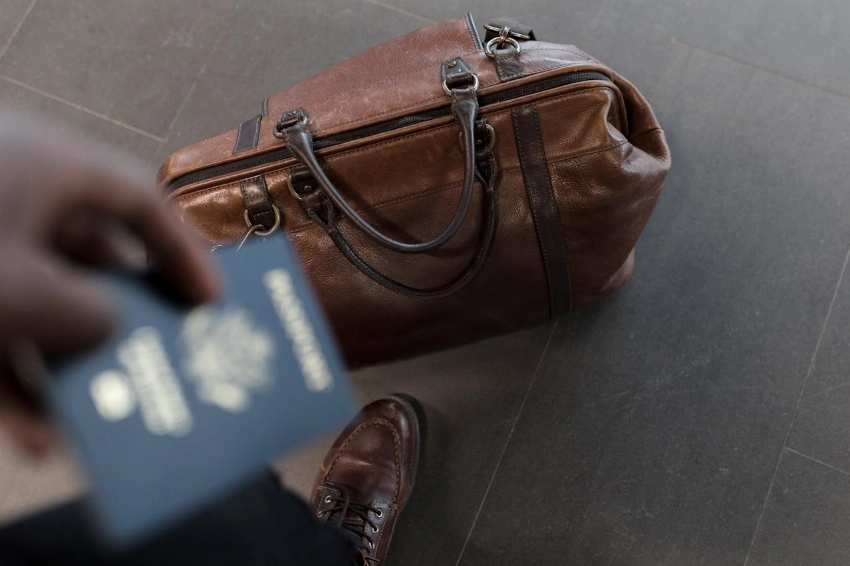
Obtaining a Canada work visa as an Indian citizen involves fulfilling specific Canada work visa requirements for Indian citizens designed to ensure that foreign workers meet Canadian labour market needs and immigration regulations. This section provides comprehensive coverage of eligibility criteria, job offer Canada work visa requirements for Indian citizens, the LMIA process, required supporting documents, and tips to pass the interview. Understanding these criteria is crucial for a successful application.
Employer-Specific vs. Open Work Permit
The choice between an employer-specific work permit and an open work permit significantly impacts your employment flexibility in Canada. Understanding these two main categories is vital for Indian citizens planning to work in Canada.
-
Requirement for Job Offer: To apply for an employer-specific work permit, you must first secure a valid job offer from a Canadian employer.
-
Labour Market Impact Assessment (LMIA): In most cases, your Canadian employer will need to obtain a Labour Market Impact Assessment (LMIA) from Employment and Social Development Canada (ESDC) before you can apply for your work permit.
-
Purpose of LMIA: The LMIA serves as proof that hiring a foreign worker will not negatively impact the Canadian labour market. It confirms that there is a genuine need for a foreign worker to fill the position because no Canadian citizen or permanent resident is available and qualified to do the job.
-
Employer's Role: The LMIA process involves the employer demonstrating genuine efforts to recruit Canadian citizens or permanent residents for the position.
-
Application Process: Once a positive LMIA is issued, the employer provides a copy to the foreign worker, who then includes it with their work permit application.
-
LMIA-Exemptions: It's important to note that certain occupations and programs are exempt from the LMIA requirement under the International Mobility Program (IMP). These exemptions are typically based on Canada's broader economic, social, or cultural interests.
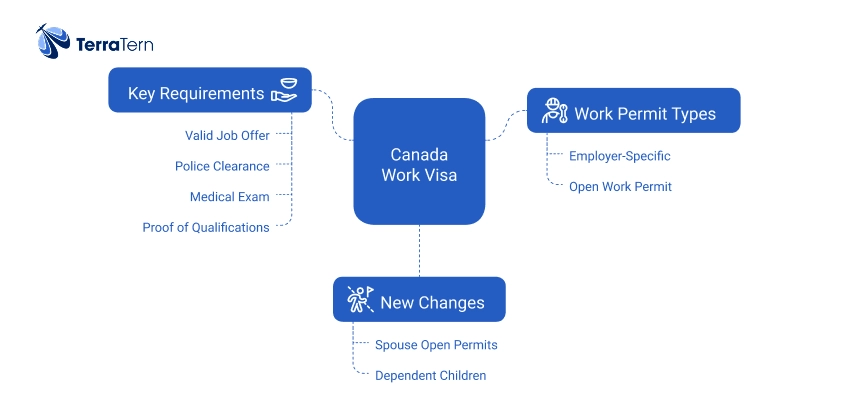
Open Work Permit
An open work permit offers much greater flexibility compared to an employer-specific permit. It allows you to work for almost any eligible employer in Canada and in most occupations. This means you are not tied to a single employer, job title, or location (with some limited exceptions, such as employers listed as ineligible or those involved in certain adult entertainment industries).
-
No LMIA Required: A significant advantage of an open work permit is that you typically do not need an LMIA.
-
Eligibility for Open Work Permit: Eligibility for an open work permit usually stems from specific programs or situations. Common categories include:
-
Post-Graduation Work Permit (PGWP): For international students who have successfully graduated from a Canadian designated learning institution.
Spouse or Common-Law Partner of a Skilled Worker or International Student
-
Recent Changes (Effective January 21, 2025): There have been important changes to the eligibility criteria for spouses and common-law partners. As of this date, an open work permit will generally only be issued if the primary worker (the skilled worker or international student) holds a job in a high-skilled occupation (TEER Category 0, 1, or select occupations in TEER 2 and 3).
-
Dependent Children: Notably, dependent children are, in most cases, no longer entitled to open work permits under these new rules.
-
Permanent Residence Applicants: Individuals who have applied for permanent residence in Canada and are awaiting a decision may be eligible for a Bridging Open Work Permit (BOWP).
-
International Experience Canada (IEC): Programs like Working Holiday, Young Professionals, and International Co-op (Internship) often grant open work permits to eligible youth from participating countries.
Key Difference in Flexibility
The fundamental distinction between the two types of permits lies in flexibility:
-
An open work permit provides the freedom to change employers, explore different industries, and work in various locations across Canada without needing to apply for a new permit.
-
An employer-specific work permit requires strict adherence to the initial job offer, meaning any change in employer, job title, or location typically necessitates applying for a new work permit.
Both types of permits generally require a valid job offer letter (or acceptance letter for students whose spouses apply for open work permits) and demonstration of your qualifications. Additionally, applicants for both types of permits often need to obtain a police clearance certificate and undergo a medical examination by an IRCC-approved panel physician.
Also Read: New Rules for Work Permit in Canada - Experts' Guide
Proof of Funds, Medicals, and Police Clearances

Beyond the job offer or open work permit eligibility, several critical supporting documents are required for a Canada work visa for Indian citizens:
-
Proof of Funds: While a job offer might indicate your income source, you may still need to demonstrate sufficient funds to support yourself upon arrival in Canada, especially for the initial period. This could include bank statements, fixed deposits, or other liquid assets. The required amount varies and is updated annually by IRCC.
-
Medical Examinations: Most work permit applicants are required to undergo a medical examination conducted by a panel physician approved by IRCC. This is to ensure that applicants do not pose a public health risk to Canadians. The results are submitted directly to IRCC by the physician. It is crucial to get this done early in the process, as it can take time.
-
Police Clearance Certificates (PCC): A Police Clearance Certificate is typically required from every country or territory where you have lived for six months or more since the age of 18. For Indian citizens, this means obtaining a PCC from the Passport Seva Kendra or relevant police authorities. The PCC confirms that you do not have a criminal record that would make you inadmissible to Canada. Ensure the PCC is recent and covers all necessary periods.
Successfully meeting these requirements, along with providing comprehensive documentation for your chosen work permit stream, significantly increases your chances of a positive outcome.
Canada Visa Cost for Indian Citizens
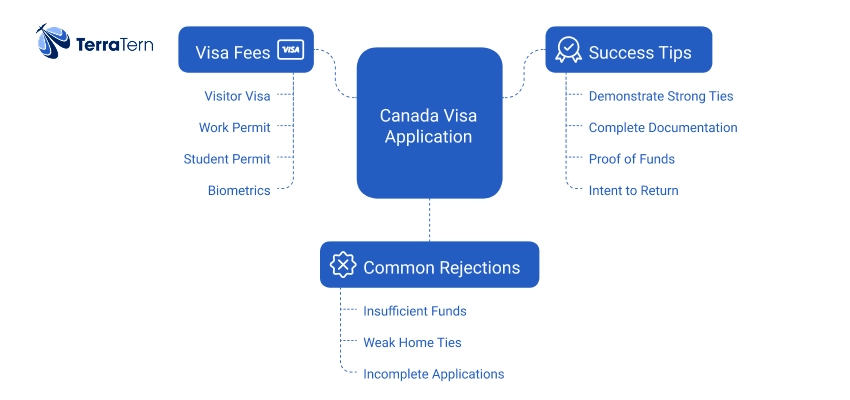
Understanding the financial outlay for your Canada visa application is a critical step in your planning. The costs encompass not only the visa application fees but also mandatory biometrics fees and potential additional charges. This section provides a detailed breakdown of the Canada visa cost for Indian citizens, covering various visa types, and highlights that all prices are in Canadian dollars (CAD).
It's important to remember that all fees are subject to change by Immigration, Refugees and Citizenship Canada (IRCC). Always refer to the official IRCC website for the most current fee schedule before making any payments. Payments are typically made online through the IRCC portal using a credit or debit card.
Here's a detailed table of the approximate Canada visa cost for Indian in 2025:
|
Visa Type |
CAD Fee |
|
Visitor Visa (single or multiple entry, per person) |
100 |
|
Visitor Visa (per family of 5 or more, applying at the same time and place) |
500 |
|
Work Permit (per person, including extensions) |
155 |
|
Work Permit (per group of 3 or more performing artists) |
465 |
|
Open Work Permit Holder Fee (additional to Work Permit fee) |
100 |
|
Study Permit (per person, including extensions) |
150 |
|
Transit Visa |
0 |
|
Biometrics (per individual) |
85 |
|
Biometrics (per family of 2 or more eligible people) |
170 |
|
Temporary Resident Permit |
239.75 |
|
Restore your status as a visitor |
239.75 |
|
Restore your status as a worker (Restore status + new work permit) |
394.75 |
|
Restore your status as a student (Restore status + new study permit) |
389.75 |
Expert Tips for a Successful Canada Visa Application for Indians in 2025
Securing a Canada visa from India requires meticulous attention to detail and a thorough understanding of IRCC's expectations. Beyond simply submitting documents, several actionable insights can significantly boost your approval odds. These tips focus on strategic documentation, clearly demonstrating your intent to return, and avoiding common missteps that lead to rejections.
-
Comprehensive and Accurate Documentation: Ensure every document you submit is current, legible, and accurately reflects the information on your application forms. Discrepancies, even minor ones, can raise red flags. If a document is in a language other than English or French, it must be accompanied by a certified translation.
-
Financial Preparedness: Provide clear and sufficient proof of funds to support yourself throughout your entire stay. This is not just about having money, but showing a consistent financial history. If someone else is sponsoring your trip, their financial documents and a clear declaration of support are essential.
-
Clear Purpose of Visit: Articulate the precise reason for your trip to Canada. Your stated purpose should align with the visa type you're applying for. For visitor visas, avoid vague statements; instead, specify who you are visiting, where you will stay, and what activities you plan to undertake.
-
Be Honest and Consistent: All information provided in your application forms and supporting documents must be consistent and truthful. Any misrepresentation can lead to a refusal and a ban from reapplying for several years.
-
Address Previous Travel History (if applicable): If you have been refused a visa by any country in the past, or had a previous visa for Canada rejected, address this honestly and provide an explanation. Trying to hide such information can lead to severe penalties.
-
Review Thoroughly: Before submitting your application, meticulously review all forms and uploaded documents. A second pair of eyes, if possible, can help catch errors or omissions.
By focusing on these key areas, Indian applicants can significantly enhance the strength and credibility of their Canada visa application, thereby improving their chances of a positive outcome.
Common Reasons for Canada Visa Rejection & How to Avoid Them in 2025

Getting a Canada visa for Indians can be challenging, but understanding common rejection reasons can significantly improve your chances. Here are the main reasons for rejection and how to avoid them, presented in simple points:
-
Insufficient Proof of Funds:
-
Reason: Not convincing the visa officer that you have enough money to cover your expenses in Canada (for tuition, living costs, or travel) and your return to India.
-
Why it happens: Low bank balance, recent large deposits that look suspicious, or not showing steady income.
-
Weak Ties to Home Country (India):
-
Reason: The visa officer believes you might not return to India after your temporary stay in Canada.
-
Why it happens: Lack of a stable job, no property ownership, no immediate family responsibilities in India, or a history of overstaying visas in other countries.
-
Incomplete or Incorrect Documentation:
-
Reason: Missing required forms, not providing all necessary supporting documents, or errors/inconsistencies in the information provided.
-
Why it happens: Not following the document checklist, submitting outdated or illegible copies, or inconsistencies between forms and supporting documents.
-
Unclear Purpose of Visit:
-
Reason: Not clearly explaining why you want to visit Canada, or your stated purpose seems unbelievable or vague.
-
Why it happens: No detailed travel itinerary, missing hotel/flight bookings, or a generic letter of invitation.
-
Misrepresentation or False Information:
-
Reason: Providing false documents, making false statements, or hiding important information (even if unintentional).
-
Why it happens: Attempting to mislead immigration authorities about your background, finances, or intentions.
-
Previous Immigration or Criminal Records:
-
Reason: Having a history of visa overstays, previous deportations, or a criminal record (even minor offenses).
-
Why it happens: Not disclosing past issues honestly, or being deemed "inadmissible" due to a criminal conviction.
-
Health Concerns:
-
Reason: Having a medical condition that could pose a public health risk or place an excessive demand on Canada's healthcare system.
-
Why it happens: Failing required medical examinations or having a condition flagged by the panel physician.
-
Lack of Travel History (for Visitor Visas):
-
Reason: For first-time international travelers, officers may scrutinize the application more closely to assess trustworthiness.
-
Why it happens: While not a guaranteed rejection, a very limited travel history can sometimes raise doubts.
-
Unsuitable Study Program (for Study Permits):
-
Reason: The chosen course of study doesn't align with your academic background or career goals, making your intent to study seem insincere.
-
Why it happens: Selecting a program that seems like a pretext for immigration rather than a genuine academic pursuit.
How to Avoid Canada Visa Rejection?
In this section, we’ll learn how to avoid rejection for a Canada visa for Indians!
Show Strong Financial Proof
-
Provide recent bank statements (last 6-12 months), salary slips, Income Tax Returns (ITR) for the past 2-3 years, and evidence of investments.
-
If sponsored, include a detailed sponsorship letter and your sponsor's financial documents and proof of relationship.
-
Ensure funds are readily available and consistent.
Demonstrate Strong Ties to India
-
Submit a clear letter from your employer confirming your job, salary, and approved leave, stating you're expected back.
-
Provide property deeds, rental agreements, or other assets you own in India.
-
Include marriage certificates, birth certificates of dependents, or evidence of significant family responsibilities in India.
Canada Visa Latest Facts & News: Stay Ahead!
In order to be successful in the Canada visa for Indians procedure in 2025, it is very important to be informed of the latest changes and demands. The following are some notable facts and the news to update you:
-
Delays in Processing: According to the current updates, the processing of Canadian work and visitor visas of Indians is taking 5-8 weeks on average, as the demand has skyrocketed. By May 2025, visitor visas to India are currently assessed at approximately 18 days and work permits are approximately 16 weeks, and study permits are approximately 9 weeks. They are dynamic and hence always consult the official IRCC to know the latest ones.
-
Biometrics Required: Most visa categories require Indian applicants to provide biometrics, and the exception is non-existent. After applying, you will get a Biometric Instruction Letter (BIL), and then you will be given 30 days in which you should give your biometrics at a Visa Application Centre (VAC).
-
No Visa-On-Arrival: India does not allow a visa-on-arrival; all kinds must be pre-approved.
-
Zero Fee Transit Visa: Canadian transit visas are still free, and they allow Indians to stay in Canada for not more than 48 hours.
-
Recent Fee Updates: Visitor visa fee: 100 CAD and another 85 CAD to cover biometrics; work permit- 155 CAD, with validity of up to 2025. These charges can be changed, and it is advisable to check with the official IRCC site.
-
Strict Return Proof: The applicants for visas and work permits are required to demonstrate that they have intentions to go back to India so as to succeed in the approval. It is a vital point of your application.
-
COVID Restrictions Relaxing: Vaccination against COVID and ArriveCAN app will be optional but encouraged; make sure to confirm the rules of the embassy of the country you visit. Although ArriveCAN is not compulsory, it is still advisable to use it in order to facilitate your entry.
-
Expansion of Visa Application Centres: VFS Global has increased the centres in India and which might help in the backlog by appointment and ease the provision of biometrics.
-
Open Work Permit: Family Members of workers are now eligible to receive open work permits, and such permits are subject to a change in eligibility conditions as of January 21, 2025. Family members attached to foreign workers can only get access to it provided that the leading individual is employed in one of the high-skilled jobs (TEER 0, 1, and a few jobs in TEER 2 and 3). All dependent children do not have a free work permit anymore under the new guidelines.
-
Digital Application Push: IRCC has shifted to an online platform preference to speed up the processing and efficiencies of updated online portals expected by 2025.
Here is how you find out secrets of passports, deconstructions, estimates, and how to get your Canada visa for Indians without any problems quickly and easily in 2025!
Conclusion
Navigating the Canada visa for Indians application process from India in 2025 demands a comprehensive understanding of current policies, meticulous attention to detail, and proactive preparation. From selecting the correct visa type, whether for tourism, work, transit, or study, to meticulously gathering all required documentation, each step is crucial for a successful outcome. The latest updates, including increased processing times, mandatory biometrics, recent fee adjustments, and revised open work permit eligibility for family members, underscore the importance of staying informed through official IRCC channels. Indian applicants must demonstrate not only financial capability but also a clear and verifiable intent to return to their home country. By avoiding common pitfalls such as incomplete applications or insufficient proof of funds, and by diligently adhering to all guidelines, Indian citizens can significantly enhance their prospects of securing a Canada visa for Indians. This expert-guided blueprint provides the essential framework for a confident and efficient application journey, paving the way for your Canadian aspirations in 2025. To learn more, visit TerraTern now!
